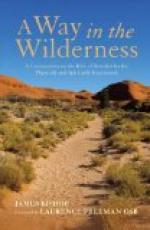It was time to kill them now. The rifle lay ready. But a change had come over the watcher too. Hitherto he had seen Upweekis as a ferocious brute, whom it was good to kill. This was altogether different. Upweekis could be gentle also, it seemed, and give herself for her little ones. And a bit of tenderness, like that which lay so unconscious under my eyes, gets hold of a man, and spikes his guns better than moralizing. So the watcher stole away, making as little noise as he could, following his compass of twigs to where the canoes lay ready and Simmo was waiting.
Sometime, I hope, Simmo and I will camp there again, in winter. And then I shall listen with a new interest for a cry in the night which tells me that Moktaques the rabbit is hiding close at hand in the snow, where a young lynx of my acquaintance cannot find him.
VIII. HUKWEEM THE NIGHT VOICE.
[Illustration: Hukweem]
Hukweem the loon must go through the world crying for what he never gets, and searching for one whom he never finds; for he is the hunting-dog of Clote Scarpe. So said Simmo to me one night in explaining why the loon’s cry is so wild and sad.
Clote Scarpe, by the way, is the legendary hero, the Hiawatha of the northern Indians. Long ago he lived on the Wollastook, and ruled the animals, which all lived peaceably together, understanding each other’s language, and “nobody ever ate anybody,” as Simmo says. But when Clote Scarpe went away they quarreled, and Lhoks the panther and Nemox the fisher took to killing the other animals. Malsun the wolf soon followed, and ate all he killed; and Meeko the squirrel, who always makes all the mischief he can, set even the peaceable animals by the ears, so that they feared and distrusted each other. Then they scattered through the big woods, living each one for himself; and now the strong ones kill the weak, and nobody understands anybody any more.
There were no dogs in those days. Hukweem was Clote Scarpe’s hunting companion when he hunted the great evil beasts that disturbed the wilderness; and Hukweem alone, of all the birds and animals, remained true to his master. For hunting makes strong friendship, says Simmo; and that is true. Therefore does Hukweem go through the world, looking for his master and calling him to come back. Over the tree-tops, when he flies low looking for new waters; high in air, out of sight, on his southern migrations; and on every lake where he is only a voice, the sad night voice of the vast solitary unknown wilderness—everywhere you hear him seeking. Even on the seacoast in winter, where he knows Clote Scarpe cannot be—for Clote Scarpe hates the sea—Hukweem forgets himself, and cries occasionally out of pure loneliness.
When I asked what Hukweem says when he cries—for all cries of the wilderness have their interpretation—Simmo answered: “Wy, he say two ting. First he say, Where are you? O where are you? Dass what you call-um his laugh, like he crazy. Denn, wen nobody answer, he say, O I so sorry, so sorry! Ooooo-eee! like woman lost in woods. An’ dass his tother cry.”




